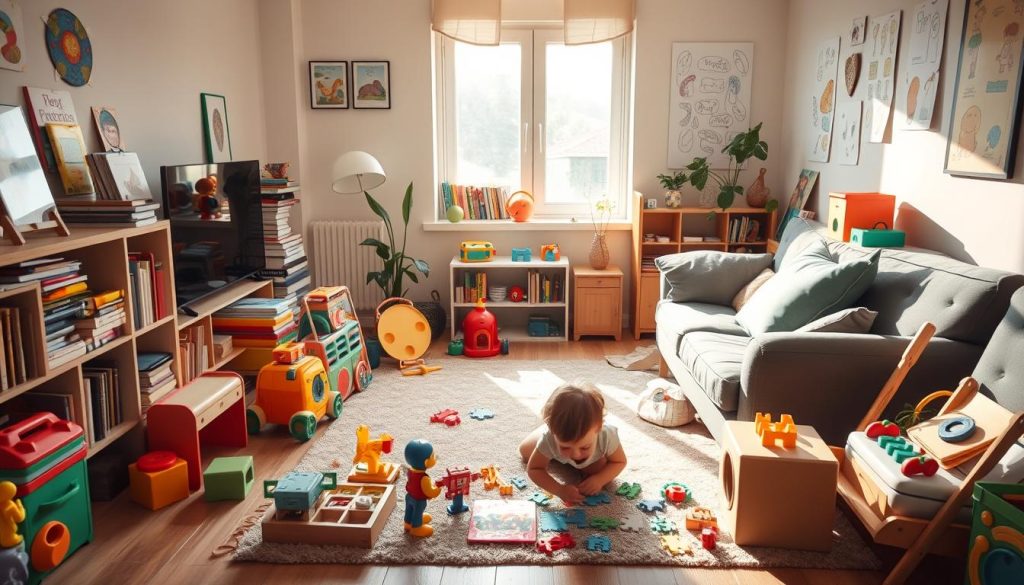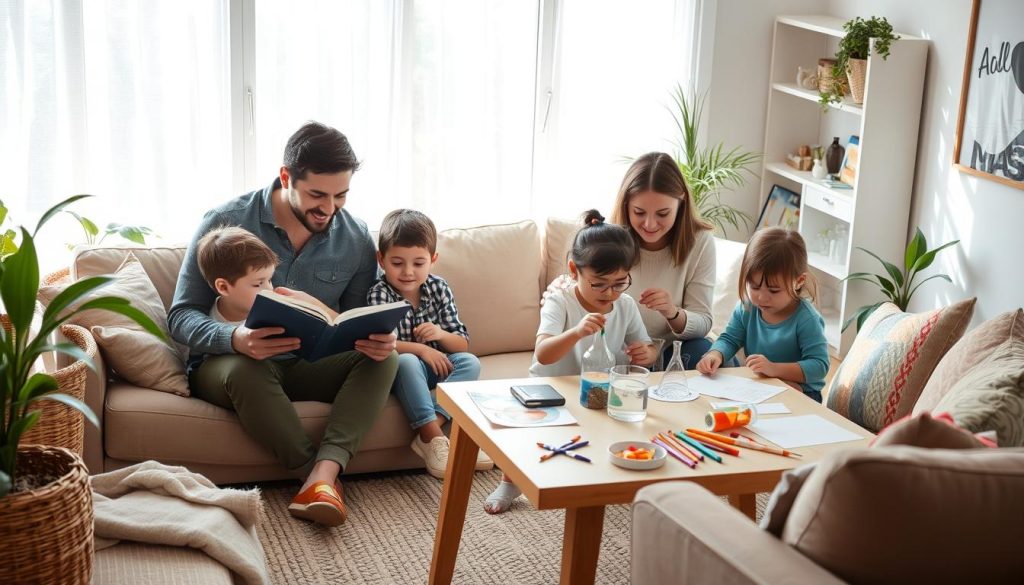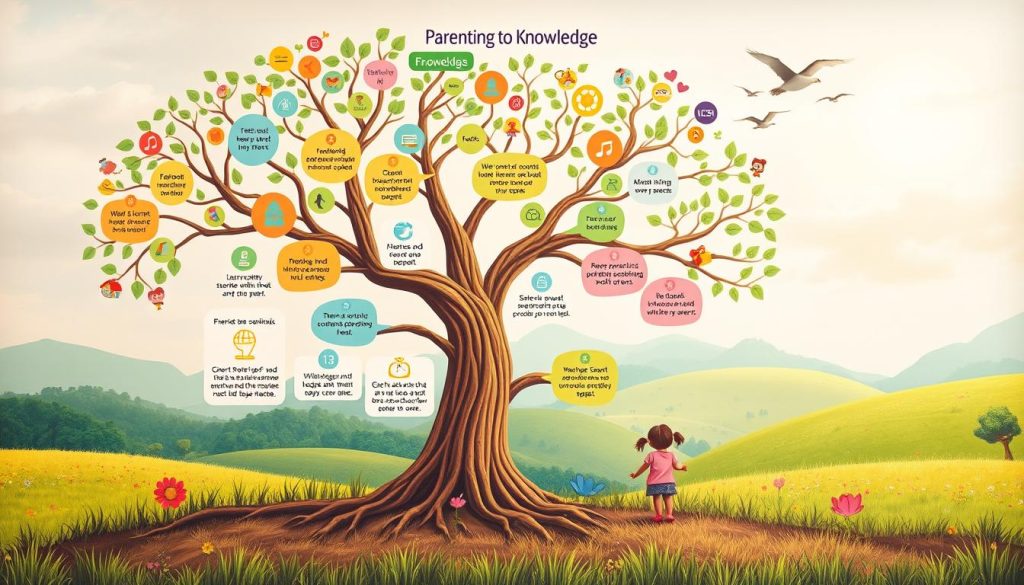
As a parent, I’ve often wondered how to really connect with my kids. I want to help them grow, nurture their spirits, and make memories that last. The journey of parenthood is both rewarding and challenging, and it’s easy to feel overwhelmed.
But what if I told you there are simple, yet profound strategies? These can change your relationship with your kids and unlock the secrets of joyful parenting?
In this article, I’m excited to share 15 smart parenting techniques and knowledge activities. These have the power to engage your children in meaningful, enriching ways. From navigating the common struggles of the digital age to building strong foundations for family connection, this guide will equip you with the tools and insights you need to thrive as a parent in the 21st century.
Key Takeaways
- Discover effective strategies for addressing modern parenting challenges
- Learn how to nurture strong parent-child relationships in the digital age
- Explore essential parenting knowledge for raising well-adjusted children
- Develop communication skills and create safe spaces for open dialogue
- Engage in creative activities that foster learning and growth
Understanding Modern Parenting Challenges and Solutions
Parents today face new challenges with the digital age. They need new ways to manage screen time and connect in a tech world. Conscious parenting is key to meeting these needs.
1. Common Parenting Struggles in Today’s Digital Age
Parents deal with too much screen time, online safety, and digital distractions. Keeping up with tech is hard. This leaves many feeling lost in managing these issues.
2. The Impact of Technology on Parent-Child Relationships
Technology has changed how we connect with our kids. While it offers learning and fun, it can also get in the way of real interaction. This can hurt the bond between parents and children.
3. Building Strong Foundations for Family Connection
To fight tech’s effects, parents must focus on family bonding. This means setting limits on screen time, doing tech-free activities, and talking more. By doing this, parents help their kids grow strong in the digital world.
| Parenting Challenge | Conscious Parenting Solution |
|---|---|
| Excessive Screen Time | Implementing digital detox periods, enforcing screen-free zones, and encouraging alternative activities |
| Online Safety Concerns | Educating children on digital citizenship, monitoring online activities, and establishing clear guidelines |
| Decreased Family Bonding | Prioritizing quality time together, engaging in shared hobbies and experiences, and fostering open communication |
By tackling modern parenting challenges with conscious strategies, families can thrive in the digital world. They can build strong connections that last.

Essential Parenting Knowledge for Raising Well-Adjusted Children
Parenting is a journey filled with joys and challenges. It’s vital to have the right knowledge and tools to navigate it successfully. Understanding your child’s developmental stages and effective discipline strategies can make a big difference. This helps in raising emotionally intelligent and well-adjusted children.
One key parenting knowledge tip is to know the different child development phases. This knowledge helps you meet your child’s changing needs. It ensures they get the support they need at each stage. From the early years to the teenage years, knowing the milestones helps you parent with confidence.
Parenting knowledge books are also very helpful. They offer insights into effective discipline, emotional intelligence, and building strong relationships. By using these parenting knowledge books, you can develop strategies that fit your family’s needs.
Exploring a parenting knowledge chart can also support your parenting journey. These charts give a quick overview of various parenting topics. They cover communication, problem-solving, setting boundaries, and more. By using these parenting knowledge charts, you can easily find the information you need.
“The most important thing that parents can teach their children is how to get along without them.” – Frank A. Clark
Equipping yourself with essential parenting knowledge is key to raising well-adjusted children. By staying informed, using effective strategies, and building strong family connections, you can navigate parenthood with confidence and ease.

Developing Effective Communication Strategies with Your Kids
As a parent, it’s key to build strong communication with your kids. This helps create trust, understanding, and a positive bond. By using active listening, creating safe spaces, and noticing non-verbal cues, you can have deeper and more meaningful talks.
4. Active Listening Techniques for Parents
Active listening is all about focus, empathy, and giving your full attention. When your child talks, look at them, nod, and repeat what they say. This shows you’re really listening. Don’t interrupt and ask questions that show you care about what they think.
5. Creating Safe Spaces for Open Dialogue
To encourage open talk with your kids, create a space of trust and acceptance. Make time for talks where your child feels safe and understood. Let them share their thoughts and feelings without fear of being judged.
6. Non-Verbal Communication Cues
Most of what we communicate is non-verbal. Paying attention to body language, facial expressions, and tone of voice can tell you a lot. It helps you understand your child’s feelings and what they really mean.
Learning these communication skills can greatly improve your parenting. It strengthens your relationship with your kids and creates a safe, open space for all to share their thoughts and feelings.

Creative Activities to Foster Learning and Growth
As a parent, I’ve found that helping my kids love learning is incredibly rewarding. I’m excited to share some parenting knowledge activities and parenting knowledge ideas that I love. They help my kids enjoy learning in fun, creative ways.
Art projects are a favorite of mine. They let kids express themselves, improve their fine motor skills, and explore feelings. We have a special parenting knowledge aesthetic area for art. It’s filled with supplies and a cozy spot for creating.
- Try making a family mural or collage together.
- Let your kids try different art materials to find what they like.
- Set up an indoor art gallery for your kids to show off their work.
Another great idea is to add educational games to your family’s routine. There are many games that teach problem-solving and boost thinking skills. It’s important to pick games that match your kids’ interests and how they learn best.
“The best way to predict the future is to create it.” – Peter Drucker
By choosing parenting knowledge activities that promote learning, you’re helping your kids grow in many ways. You’re also getting closer as a family. I suggest trying out these ideas and see how they can inspire and engage your kids.
Building Emotional Intelligence Through Conscious Parenting
As parents, we have a big role in helping our kids grow emotionally. Conscious parenting focuses on being aware of our kids’ feelings. It helps them learn to understand and manage their emotions. Let’s see how we can teach them these important skills.
7. Teaching Empathy and Self-Awareness
Empathy is key to emotional intelligence. It means understanding and feeling what others feel. By showing empathy and teaching our kids to see things from others’ viewpoints, we help them develop this skill. Also, knowing their own feelings helps them control their emotions and make better choices.
8. Managing Big Emotions Together
Kids face many emotions, from happiness to sadness. As conscious parents, we help them deal with these feelings. We validate their emotions, teach them how to cope, and work together to find solutions. This way, they learn to manage their feelings and we grow closer as a family.
9. Creating Emotional Safety
Feeling safe to express emotions is vital for kids. We create this safety by being trustworthy, empathetic, and using positive affirmations for kids. This lets them open up, starting their journey in conscious parenting.
Building emotional intelligence is a journey we take together. Through conscious parenting, we help our kids become aware of their feelings. This way, they can handle life’s challenges and grow into well-adjusted adults.
Smart Time Management for Productive Parents
As a busy productive mom, I face many challenges. I juggle work, home duties, and family time. But I’ve found ways to manage it all and keep a balance. Here, I’ll share some time management tips that have helped me and can help you too.
Creating a realistic daily schedule is key. It means putting tasks in order and setting time for work, chores, and family. I use a planner to keep track of my day and avoid too much.
- Identify your most productive hours and capitalize on them
- Batch similar tasks together to increase efficiency
- Delegate household responsibilities to other family members
- Utilize productivity apps and tools to stay organized
- Take regular breaks to recharge and avoid burnout
Learning to say “no” is also important for productive moms. It’s okay to say no to work and personal commitments when you’re full. Remember, your family’s needs come first.
“The key to time management is not doing more, but doing the right things.” – Cal Newport
By using these parenting solutions, I’ve found more time for my kids. I’ve kept my job and home life in order. It’s hard work, but it’s worth it for better parenting.
Positive Discipline Techniques That Actually Work
As parents, we all want our children to behave well. But old ways of discipline often don’t work. They can make kids resentful and hurt our relationship with them. Luckily, there are better positive parenting solutions to help us teach our kids the right way.
10. Setting Healthy Boundaries
It’s key to set clear rules for your kids. Instead of strict punishments, make rules that fit their age. Talk to your kids about why these rules are important.
11. Natural Consequences vs Punishment
Punishments can make kids feel bad and resentful. Natural consequences help them learn in a better way. They let kids see how their actions affect things, teaching them to solve problems.
12. Reinforcing Good Behavior
Positive feedback is a great way to encourage good behavior. Praise your kids when they act well. You can say nice things, give them rewards, or spend quality time together.
Using these smart parenting methods can make your home a place of learning and growth. It’s not always easy, but it’s worth it to see your kids grow up well.
Educational Games and Activities for Different Age Groups
As parents, we know how vital it is to find fun and educational activities for our kids. From toddlers to teens, there are many parenting knowledge activities and parenting knowledge ideas that help grow their parenting knowledge aesthetic. Let’s dive into some engaging and enriching options.
For our youngest, interactive board games, puzzles, and storytelling are great. They help with thinking and language skills. Look for games that encourage solving problems and using imagination. Outdoor fun like scavenger hunts and nature walks also spark their curiosity.
As kids get older, we can introduce more challenging games. Strategy games, coding, and DIY STEM projects sharpen their thinking and problem-solving. Creative activities like art, music, and theater also enrich their parenting knowledge aesthetic.
| Age Group | Educational Games and Activities |
|---|---|
| Toddlers (2-4 years) |
|
| Elementary (5-10 years) |
|
| Tweens/Teens (11-18 years) |
|
Finding the right mix of structured activities and free play is key. It lets our kids explore their interests at their own pace. By focusing on parenting knowledge activities, parenting knowledge ideas, and parenting knowledge aesthetic, we support their growth and prepare them for success.
Balancing Structure and Freedom in Parenting
As a parent, I’ve learned that finding the right balance is key. It’s important to have some routine and consistency. But, it’s also vital to give kids plenty of chances to be independent and explore on their own.
13. Creating Flexible Routines
I’ve found that flexible routines work best for my kids. Mixing structured activities with free playtime keeps them stable yet open to new experiences. This way, they learn responsibility and self-discipline without feeling trapped.
14. Encouraging Independence
Encouraging independence is a big part of my parenting. I give my kids more freedom as they get older. This could be letting them pick their outfits, do simple chores, or decide how to spend their time. It boosts their confidence and prepares them for life’s challenges.
15. Maintaining Consistent Expectations
Even with flexibility and independence, setting clear expectations is important. Having consistent rules gives my kids a stable base to grow from. It teaches them right from wrong and helps them understand our family values.
Conclusion
Parenting in today’s world brings unique challenges, but with the right knowledge and strategies, it’s possible to create meaningful connections, foster growth, and build strong, resilient families. By embracing conscious parenting, developing effective communication, and nurturing emotional intelligence, we not only support our children but also strengthen the family bond.
Engaging kids in creative and educational activities, setting clear expectations, and balancing structure with freedom allow us to guide them confidently. Remember, every moment shared is an opportunity to teach, learn, and grow together. Let’s use these techniques to make parenting a joyful journey filled with love, understanding, and lifelong memories.




